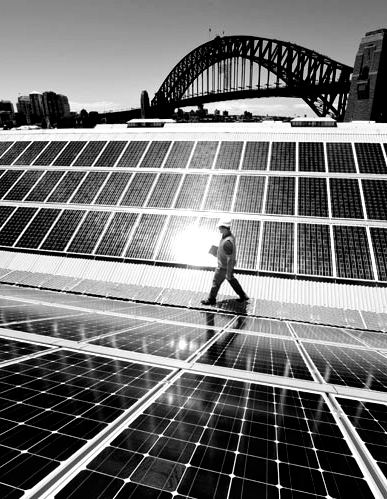Solar firms accused of confusing deals
 As the good deals for rooftop solar decline, energy retailers have been accused of capitalising on consumer confusion.
As the good deals for rooftop solar decline, energy retailers have been accused of capitalising on consumer confusion.
Government solar rebates are expiring in New South Wales, South Australia and Victoria, leaving over 250,000 customers looking for a better deal as many prepare to pay their first power bills in several years.
Energy industry consumer advocate Martin Gill says power companies have created minefield for consumers.
“We're seeing deals which offer very large discounts, we're seeing deals that offer reasonably high feed-in tariffs, and we're seeing some special deals which are being offered to limited subsets of the consumers who are affected,” Dr Gill told reporters.
“Those deals when you actually look at them are often worse than if you accepted standards deals that are available in the marketplace.”
He said it was vital to read the fine print.
“For a solar customer, you have the discount you're being offered, you have the daily charge of being connected to the network, you have your electricity usage charges and you have the feed in credit,” he said.
“So offering someone a very attractive feed-in credit while you have increased several of those other factors may result in them paying more per year than if they were accepting a less generous feed in tariff.”
Community group Solar Citizens has singled out Energy Australia for offering “less than genuine” deals on smart meters.
“There are a number of other seemingly free smart meter deals which do come with conditions, and often these are buried or just not displayed at all,” Solar Citizens spokesperson Reece Turner told the ABC.
“Energy Australia is the one to watch out for here, because there is a $10-a-month charge for the meter and exit penalties which are not disclosed in the advertisements we've seen for the offer.”
Energy Australia issued a statement defending its smart meter package.
“Our research tells us that customers don't want to pay the upfront costs for a smart meter and its installation, so we've created a range of plans in our Solar Booster Range, starting from $10 a month for the Basic Booster which covers the cost of the smart meter, including installation,” Energy Australia said.
“Then there's the feed-in tariff booster; with that product customers get the smart meter with installation, as well as their solar panels cleaned annually and receive reporting on their usage and generation so they can manage their consumption and how and when they use the energy generated on their roof.”
But the NSW Energy and Water Ombudsman says a majority of complaints about the closure of that state’s Solar Bonus Scheme relate to confusion about the installation of new meters.
The Australian Energy Regulator (AER) - which runs a site for consumers to compare energy deals - says laws require power companies to provide clear information to consumers.
“We're out there actively monitoring them, they have obligations to ensure they're providing accurate, timely and upfront information. If we find that they are not complying with the rules and legislation, we will take appropriate action,” said AER chair Paula Conboy.







 Print
Print